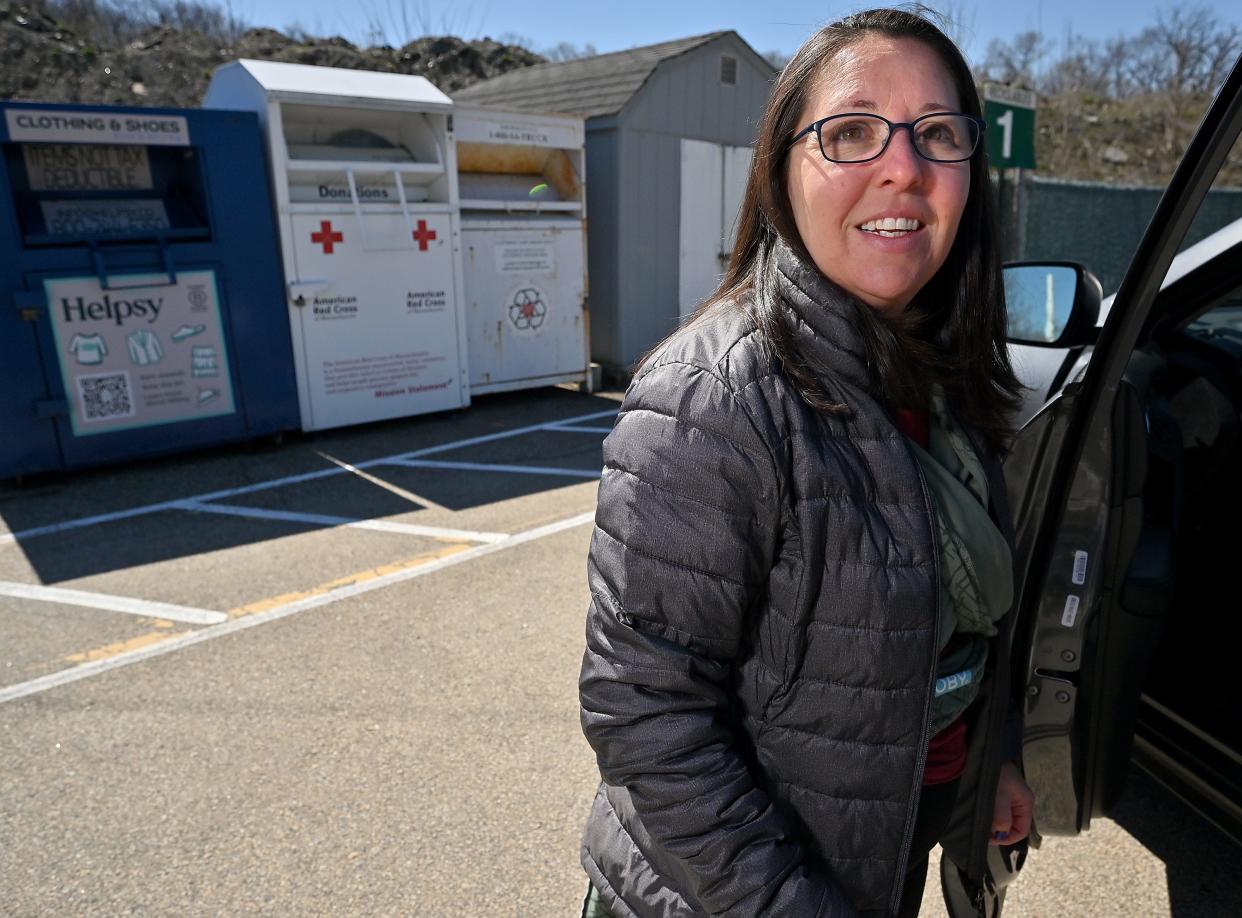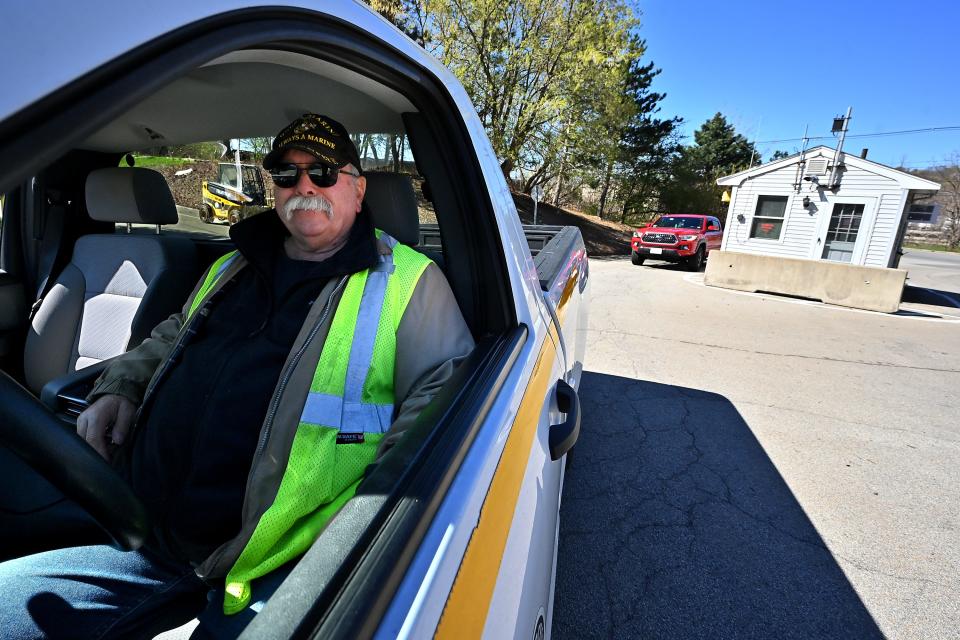You can't throw out most textiles in Mass. So why are some people still doing it?

WORCESTER — It appears some people are tossing clothing and other textiles in the trash, despite state regulations on the books for the past 16 months that prohibits it.
Worcester resident Courtney Heyman believes that’s the case after she recently dropped off some of her used textiles in a legal collection bin at the Worcester drop-off facility on Millbury Street.
“I think people (in Worcester) are throwing their textiles in the garbage, based on what I’m seeing in people’s trash,” said Heyman.
If anyone knows if that's happening, it would probably be Jim Langley. A city employee for over 50 years, including the last 20-plus at the drop-off site, Langley said, "I would say they do, but that's my own personal opinion."
That's a no-no, because on Nov. 1, 2022, the state Department of Environmental Protection banned the disposal of most textiles. It's also illegal to transport textiles for disposal.
The list of textiles that can’t be chucked in the waste bin includes clothing, shoes, bedding, towels, curtains, fabric and similar products. Textiles contaminated with mold, body fluids, insects, oil or hazardous substances are exempt from the ban.
The goal is to protect the environment by keeping textiles out of incinerators that pollute the air. Also, from going into landfills, where textiles decompose, generating methane gas that is a major contributor to global warming and toxic chemicals that leach into ground water.
Not just a big-city challenge
Some small towns also appear to struggle with the ban. Jan Parke leads an all-volunteer team that runs the Leicester recycling center, where a donation box receives textiles collected by the Salvation Army.
Parke has lived in Leicester, population 11,000, for over 30 years and believes residents are generally doing a better job of dropping off textiles or donating them to local thrift stores. However, based on her observations, Parke thinks some residents are dumping their clothes and other textiles in the trash. Leicester doesn’t have municipal trash pickup. Residents contract with private haulers.
“Clothing and textiles are a very small part of our (Leicester recycle center) operation. It should be a lot more,” said Parke. “I don’t think the general public has gotten the idea of how polluting textiles can be.”
Time for some numbers
Massachusetts wants to cut the amount of textiles in the waste stream. In 2022, textiles represented 5% (230,000 tons) of municipal waste disposal statewide, according to the state DEP. The goal is to cut the number to 127,000 tons by 2030.
State inspections and enforcement complement the statewide ban, plus efforts to raise awareness for residents and businesses of its existence.
That work may account for more cities and towns participating in collection efforts — 245 in 2023 compared to 208 in 2021. Total textile tonnage collected by municipalities is also on the rise, from 4.4 tons in 2017 to 7.9 tons in 2023.
Drop boxes give some Helpsy
Drop boxes are the primary method of collection, according to the state DEP.
Three boxes are located at Worcester’s drop-off facility, including one each operated by the Salvation Army and the American Red Cross.
Helpsy owns the other, and its contract with Worcester since the beginning of 2023 gives residents free collection options for their textiles. Besides the metal bin at the drop-off center that Heyman used to deposit clothing, old towels and rags, there’s also free curbside pickup.
A total of 386 Worcester customers have signed up for the curbside option that accounts for a vast majority of Helpsy’s textile collections in Worcester. Between Jan. 1, 2023, and the end of March, curbside collected 19,745 pounds of textiles out of Helpsy’s total Worcester haul of 24,389 pounds.

The company declined to disclose the amount it pays Worcester for each pound of textiles collected.
Helpsy’s warehouse in Woburn is where 5% of collections are sorted by brand name and condition to give companies data on what happens to their items after they’re sold. The rest are sold to various outlets, including nonprofit thrift stores, including Goodwill and the Salvation Army.
Lisa Sciannella, Helpsy’s chief of staff, noted there’s an opportunity to scale up the company’s operations in Worcester. More public awareness to residents and businesses about what textiles can and can't be recycled is needed to boost business, she said.
Educating youngsters about the environmental benefits of textile reuse is another strategy. Helpsy pays school districts for the textiles collected, and Sciannella said the company would like to work with the Worcester Public Schools.
“There’s a misconception that damaged textiles aren’t suitable and go into the trash,” said Sciannella. “Ninety-five percent can be reused and recycled. They have a second life and don’t belong in the trash.”
Like Heyman and Parke, Sciannella believes there’s a segment of the public that continues to throw away perfectly good textiles that can be reused.
“Are people throwing away their textiles? Probably,” she said.
Some are a mess
Many communities, large and small, have a slew of textile drop boxes scattered about that are owned by for-profit and nonprofit organizations. There are some familiar names here, including Planet Aid and Goodwill.
In some communities, the boxes can be an eyesore because donations are strewn outside the bins. Leicester has guidelines that regulate the bins, according to Parke. "We're trying to keep a tight lid on it," she said.
Worcester has drop-off bins operated by entities that don't have a partnership with the city. City Hall didn't respond to a question about whether Worcester is finding items other than textiles deposited in the boxes or left scattered outside them.
How much is illegally discarded? It's uncertain
Getting a handle on the number of textiles illegally discarded is a challenge, in communities large and small.
Worcester doesn’t know how many banned textiles are thrown out by residents and businesses. It hopes to get a handle on the numbers when the city’s Zero Waste Master Plan is expected to be finished in 18 months.
Worcester has a pay-as-you-throw curbside trash collection program. The city’s Public Works Department collects the trash and it's trucked to WIN Waste Innovation's incinerator in Millbury, which serves 40 communities.
WIN staff inspect every load for banned items, said Mary Urban, WIN’s senior director of communications and community. During the first three months of this year, there were no textile-related load failures from Worcester, said WIN.
The state DEP conducts unscheduled visits to inspect WIN’s records and loads.
Inspections are based on a standard set by the state DEP, according to WIN. If a load contains at least 10% textiles, options include rejection, acceptance or removal of the textiles from the pile. In the latter option, disposal is arranged for items that can’t be recycled.
Given the thousands of pounds of waste discarded daily, and the need to get trucks back on their routes quickly, WIN noted it can’t sort through every bag that arrives at its incinerators. In cases when loads can’t be accepted because textiles are mixed in, the company said it notifies the customer and gives waste ban guidance.
To head off problems at the pass, WIN said residents need to know what textiles can and can’t be dropped off at local collection sites.
Small-town perspective
Look no further than Spencer, with a population of 12,000, for a small-town perspective on the challenge of knowing the number of illegal textiles in the waste stream.
Spencer doesn’t have municipal curbside trash pickup. Residents can buy a dump sticker and use the town’s transfer station to deposit their bagged garbage.
“I can’t venture a guess” about the number of banned textiles in Spencer's bagged garbage, said Peter Boria, the town's utilities and facilities superintendent.
Some residents pay a private hauler to take their garbage away, which is deposited at WIN's Millbury incinerator. None of the trash was rejected at the incinerator during the first three months of this year for including textiles, said WIN.
Bins in town owned by private companies collect donated textiles, but since they’re outside of Spencer’s control, the town doesn’t know the number of textiles collected.
What about mattresses?
At some point, those soft, medium and firm cushions that we hope to get a good night’s sleep on eventually reach the point when we want a new one. If they can be reconstituted in some form, they can’t be thrown out, according to the statewide textile ban.
Last year, Worcester’s drop-off center collected 87 crib mattresses, 767 box springs and 2,218 mattresses. Residents paid $15 per drop off, a break-even amount in the city’s contract with Superior Waste and Recycling. The Worcester company disassembles and recycles the mattresses.
Spencer recycles mattresses at $35 a pop, but Leicester doesn’t have the budget or the manpower to recycle mattresses, said Parke.
“We do have other places to refer our citizens to” for mattress collection, said Parke, “but they’re not, in my estimation, fully adequate.” They're either too expensive or too far away, according to Parke.
Awareness and more awareness
There appears to be a consensus on the need to pump more resources into public awareness about the statewide ban in order to cut down on the amount of textiles thrown in the trash. That means clearly telling people what can and can’t be recycled, reused and repurposed. Plus, where items can be dropped off.
Worcester will use community events, social media posts, mailers and newsletters to increase awareness, said a city spokesman.
Moments after depositing her bag of textiles in the Helpsy bin, Heyman said she had a tough time finding the bin and had to call the city to help her locate it. As Heyman sees it, many residents don’t know how to recycle their textiles, and where to do it.
“We need more bins, and they need to be more accessible,” she said.
Contact Henry Schwan at henry.schwan@telegram.com. Follow him on X: @henrytelegram.
This article originally appeared on Telegram & Gazette: Many in Worcester County toss textiles in trash despite state ban

